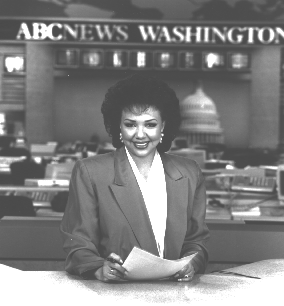Page 45
[Begin Tape 1, Side A]
Moorhus: Let's start in September of 1970 when you went to work for WMAQ-TV.
Simpson: Did I tell you that I first came to their attention when I was on the radio in Iowa? Did I ever tell you that story?
Moorhus: I think so, but go ahead and repeat it.
Simpson: Well, only because it was kind of coming full circle. I had just begun in radio at WCFL in Chicago in 1965, I was on the air, and, as I say, it was a novelty. People were not used to hearing women delivering the news. Lee Phillip had a TV show, kind of a noon lady talk show kind of thing, and had celebrities from town, but you really did not hear a female voice doing the news before I began. So I got a lot of attention, and people were [saying], "Hey, there's a woman doing the news."
So in a very short period of time, a lot of people had heard about me because I was on this top rock station and doing news, and I got a call from the news director of WMAQ. This was like only six months after I had begun in radio. He called me up and said, "I'd like to talk to you about coming to Channel 5."
I met him for dinner, or lunch, and he told me that he had been driving to visit his parents in Iowa, had been driving on the highway, had tuned in the radio and picked up WSUI in Iowa City, and had heard my voice, heard me delivering a newscast. He said he tucked the name in the back of his mind and thought, "Wow, she really sounds good," and kind of didn't think about it anymore.
Then a couple of years later, I'm on the air in Chicago and he remembers that this was the voice he had heard, and invited me to leave radio and start a television career. Of course it was tempting, and I talked to the news director [at WCFL], who was my news director and who had taken a chance on me without any really commercial experience to start in a big market like Chicago. I told him that I had had this offer, and he said, "You stay with me for three years," (I had signed a three-year contract). He said, "I don't want to stand in your way if this is something that you really want to do, but you need to hone your craft. You need to learn. There's lots you can learn in radio, and you will be a household name. You go back to them in three years when you are somebody and you'll be able to make your own terms. You'll be able to get a better deal, you'll bring more to the station with your notoriety and your fame as a radio personality." He said, "Now, do want you want to do, but think about that. Think about what you can come back to them with after you've had these experiences."
And I listened to him, and I'm really glad I listened to him, because over that summer when I was on maternity leave, and Channel 5 came back to me after I'd had that big scoop on the Chicago Seven trial, I was able to be in a much better position in terms of negotiating what duties I would have. I wanted opportunities to anchor, and I wanted to cover certain things. So that was really good advice that this guy gave me.

